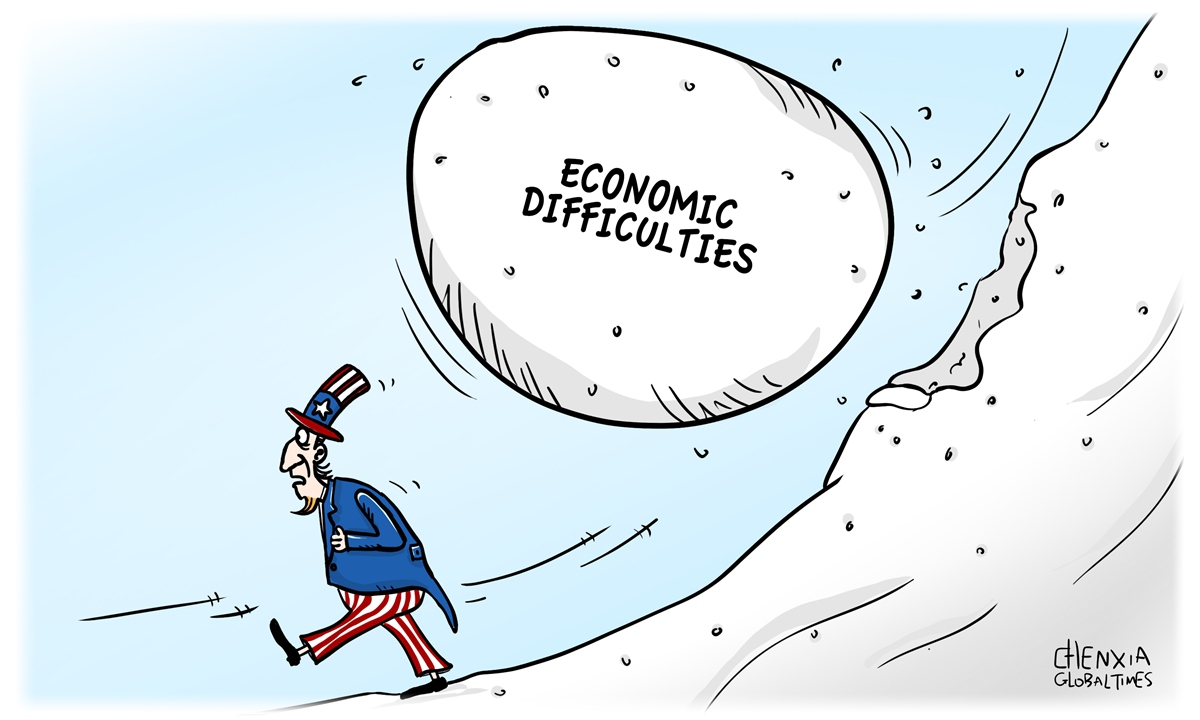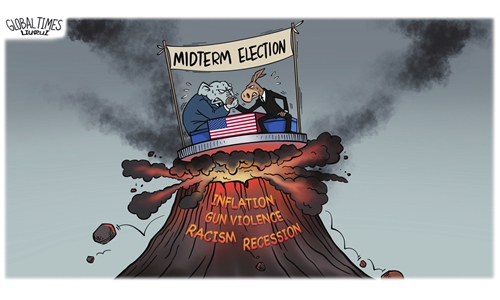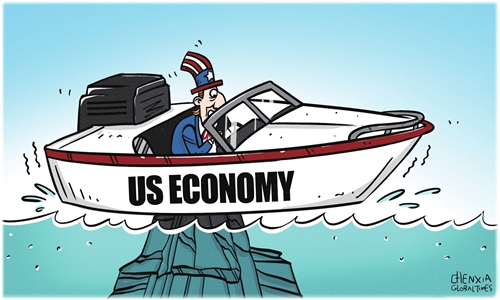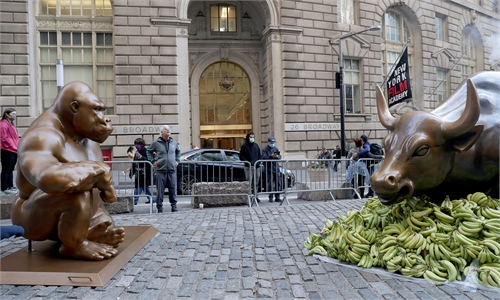
US economy Illustration: Chen Xia/Global Times
Despite the growing pessimism about the US economy and fears of a potential recession, US President Joe Biden appears to be ignoring serious problems for the US economy, including his own policies, and only focusing on certain positive aspects of the US economy ahead of the US midterm elections.
During a speech in San Diego on Friday, Biden signaled he hopes to speak with oil industry executives about energy prices, while touting the latest jobs report to prove that the US economy is growing, The Wall Street Journal reported on Friday.
While the US president has been trying to emphasize economic indicators that are favorable to his record to improve his pitch to voters in the final throes of the campaign, he cannot defy the fact that Americans are still deeply pessimistic about the economy. And their worries are not unfounded. The probability of the US economy slipping into a recession in the next 12 months has hit 100 percent, according to the Bloomberg Economics model projections released in mid-October.
There are many reasons behind the potential US recession, of which the major one is the inflation and the Federal Reserve's aggressive interest rate hikes. Last week, the Fed raised interest rates by 75 basis points for the fourth consecutive time. However, recent inflation data suggested that consumer prices in the US remain at high levels, which is mainly attributed to the Biden administration's irresponsible money-printing policy. The situation also poses a dilemma for US policymakers. The Fed needs the rate increases to curb inflationary pressure, while aggressive interest rate hikes have raised the borrowing costs and are threatening to cause job losses, increasing the risk of the US economy slipping into a recession.
On the surface, the US economy seems to be relatively strong. The US economy grew at an annual rate of 2.6 percent in the third quarter, marking its first increase in 2022 and a sharp turnaround after six months of contraction. Yet, a crisis may be just around the corner. Indeed, unemployment is generally expected to surge next year as a result of the rate hikes, which is part of the reasons why forecasts for the US economy are becoming increasingly gloomy.
From the perspective of the external environment, the Fed's aggressive rate hikes have actually allowed the US to export its own crisis to other countries, especially those in Europe. Many European economies have no choice but to follow the US in raising interest rates to alleviate capital flight pressure, making it hard for themselves to adopt policies based on their own needs.
Meanwhile, the strong dollar has also exerted great negative impact on many developing countries, with some even facing insolvency crisis. By taking advantage of the hegemony of the US dollar, the US tried to defuse its severe inflation and force the world pay for its abuse of monetary easing. But if the world economy plunges into a new round of crisis, how can the US economy be immune from these external shocks?
While it seems that Washington has been trying to preserve its position as the world's superpower, the irony is that it has been doing exactly what may undermine its own strength that supports its dominant power. For instance, the credibility that the US dollar has as a global currency has been constantly undermined by its monetary policies. And the same is true of the "decoupling" push against China.
At a time when US inflation has hit a four-decade high, economic coordination and cooperation between the US and China would have been especially needed, given the fact that the Chinese manufacturing sector has a massive production scale and foundation and that there are strong complementarities between the two economies.
But now the Biden administration has imposed various kinds of trade and technology curbs on China to weaken its ties with the Chinese economy, which will ultimately strike a heavy blow to the US economy.
For instance, after the US government announced a broad set of chip-related technology export controls in October, US semiconductor companies have reportedly bore the brunt of their government's legislation. Intel, one of the leading US chip companies, has reportedly planned its biggest round of layoffs since 2016, while US chipmaking technology supplier Applied Materials Inc said export restrictions to China would result in a $250 million to $550 million loss in net sales in the quarter ending October 30.
The US' economic policy has been hijacked by politics for too long. Without making any meaningful policy changes, the US economy would not be improved fundamentally, which will be an increasingly severe challenge for the Biden administration. Biden can tout his economic policies all he wants, but the truth is that his deviation from law of economics is unsustainable.



